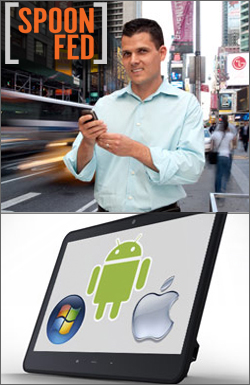SpoonFed: Has Windows Lost the Tablet War?
Sign up to receive The Snapshot, a free special dispatch from Laptop Mag, in your inbox.
You are now subscribed
Your newsletter sign-up was successful
The January 2003 cover of LAPTOP is a bit of a running joke in our office. Beneath a picture of the HP Compaq TC1000 Tablet PC, it reads, “Does This Change Everything?”
Well, at least we posed it as a question. At the time, I believed that tablets had a shot of shaking up the PC industry, but high prices and a dearth of compelling consumer software relegated tablet PCs to ultra-niche status for the next several years. Yet here we are again, on the verge of another tablet revolution, though this time the pen has given way to touch as the primary input method. And judging by the hype surrounding Apple’s upcoming device—not to mention the plethora of Android-enabled tablets showcased at this year’s Consumer Electronics Show—Microsoft could very well be undone by the category it created.
When you look at such Android-powered tablets as the ICD Ultra and Notion Ink Adam, you can’t help but wonder whether full Windows is required to run the next generation of hardware. These devices boot quickly (or at least they will when they’re closer to shipping products) and are capable of delivering high-quality multimedia playback, thanks to Nvidia’s next-generation Tegra chip. The 10.1-inch Notion Ink Adam can do what most users might want to do with a tablet, including reading eBooks on a breakthrough color e-Paper display, surf the Web, and play 1080p video. The 7.0-inch ICD Ultra, which may come to market through Verizon’s LTE network under a different brand, can handle Flash 10 and download your favorite sites at lightning-fast speeds. Both of these tablets also promise much longer battery life than Windows PCs.
On the other hand, the user interfaces we saw on both of these tablets were unfinished, and it will be up to the manufacturers and their partners to deliver a well-rounded user experience. That’s Android’s blessing and curse: it’s completely open for customization, but it also requires a fair amount of work to make your product look polished and user-friendly. Plus, only a handful of Android apps have been optimized for larger screen devices.
The advantage that Windows 7 has—for tablet makers, software developers, and shoppers—is familiarity. What remains to be seen is whether this OS is overkill for a category that’s more about content consumption than creation. MSI’s dual-screen tablet concept, showcased at CES, has two 10-inch displays and the ability to use both independently or as one (great for reading eBooks). MSI’s point is that the device is more than just an eReader; it’s a netbook with a touch keyboard and eReader in one. I have serious questions, however, about how long a Windows tablet with two screens can last on a charge, as the OS simply requires more resources than Android.
Microsoft CEO Steve Ballmer enticed us with a new breed of slate PCs coming this year during his CES keynote, saying that we’re talking about “something that’s almost as portable as a phone and that’s as powerful as a PC running Windows 7.” Building on the touch capabilities of the OS, Ballmer told the crowd that these devices were perfect for reading, surfing the Web, and entertainment on the go. He showed Kindle for PC running on the new HP tablet, but at least during this brief tease you didn’t get the sense that Windows was required for this or any of the other above activities.
So it doesn’t come as much of a surprise that the latest rumors have Apple’s tablet running an ARM-based processor and the iPhone OS instead of full-blown Snow Leopard, basically an “iPhone on steroids.” The argument for such a direction would be that tablets don’t need to be full PCs to give consumers what they desire out of a device that sits between a smart phone and full-blown netbook.
Sign up to receive The Snapshot, a free special dispatch from Laptop Mag, in your inbox.
There’s a reason that Dell, HP, MSI, and others showed off Android-powered concept tablets and smartbooks at CES. They’re hedging their bets. If Microsoft is going to be relevant in the tablet 2.0 era, it will need to prove that Windows is the right platform, and quick. Because the competition is ready to pounce.
Editor-in-chief Mark Spoonauer directs LAPTOP's online and print editorial content and has been covering mobile and wireless technology for over a decade. Each week Mark's SpoonFed column provides his insights and analysis of the biggest mobile trends and news. You can also follow him on twitter.


